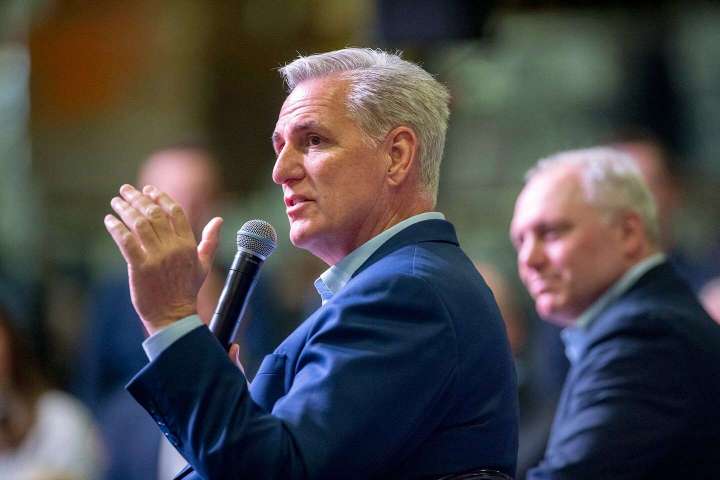Conventional wisdom about midterm elections has it that they are a referendum on the incumbent president and the party in power. But this year’s decision for voters is shaping up to be more complicated than that.
The House GOP’s vague ‘Commitment’ reveals problems ahead

As a result, what once appeared to be a banner year for the GOP is more of a dogfight. The party is still expected to take back the House, which would require picking up only five additional seats. But their year-ago predictions of flipping as many as 60 districts have vanished. And the outcome in the Senate, where Republicans need a net pickup of only one seat, is anyone’s guess.
The new electoral pressure on Republicans explains why the House’s speaker-in-waiting, Minority Leader Kevin McCarthy (R-Calif.), and 30 of his colleagues went to Monongahela, Pa., on Friday to unveil what they touted as their “Commitment to America.”
Follow Karen Tumulty‘s opinions
Follow“We want to roll it out to you, the entire country, to know exactly what we will do if you would trust us and give us the ability to take a new direction for this country,” McCarthy told a friendly audience at a manufacturing plant. “What the Commitment is, is a plan.”
A plan? A set of policy specifics? Hardly. It was not even close to what Republicans had hoped would sound like an echo of the storied 1994 “Contract With America,” which was not only a set of campaign promises but also a blueprint for governing.
The Pittsburgh-area event was a telling indication of the difficulties that lie ahead for McCarthy if he is given the gavel he has so long coveted — and, with it, the responsibility to actually govern at the head of a fractious, fragile majority in which the most extreme members are determined to call the shots. The hard-right Freedom Caucus has indicated that its support for McCarthy will hinge on rules changes that would curb the speaker’s power and make it easier to oust him.
With genuine unity beyond their grasp, what the House Republicans have come up with is a one-page list of slogans, such as “curb wasteful government spending” and “fight inflation and lower the cost of living.” There are also a few nuggets thrown in — “defend fairness by ensuring that only women can compete in women’s sports” — to rev up the base.
Their most urgent priority, which McCarthy has vowed the GOP will tackle on its “very first day,” is to “repeal 87,000 IRS agents” — a reference to, and false characterization of, the recently passed $80 billion in badly needed funding for the beleaguered Internal Revenue Service, which would beef up taxpayer services and enforcement of the tax code.
Abortion was mentioned, vaguely, as a promise to “protect the lives of unborn children and their mothers.” But the “Commitment” does not answer how, because Republican members themselves are deeply divided on the issue of whether and at what point in pregnancy a federal ban should apply.
Compare this with the “Contract With America,” which was signed by more than 300 Republican candidates and laid out 10 poll-tested pieces of ambitious legislation that a House GOP majority would pass in its first 100 days. Among them: tax cuts and constitutional amendments to balance the budget and impose 12-year term limits on members of Congress.
While it is debatable whether the Contract played much of a role in giving the Republicans a landslide and control of the House for the first time in four decades — and although little of it became law — it was invaluable in setting the course for their early days. That was a time when it briefly appeared their speaker, Newt Gingrich, had transformed the power dynamic of Washington. Bill Clinton was sidelined to the point where he felt compelled to declare that he was still “relevant.”
President Biden, on the other hand, is a central figure in Republican plans — and not in a good way. A GOP majority with subpoena power is certain to go into overdrive on investigations, probing everything from his son Hunter’s business dealings to the administration’s border policies to the withdrawal from Afghanistan. On the day the FBI made its search of Trump’s Mar-a-Lago home, McCarthy tweeted: “Attorney General Garland: preserve your documents and clear your calendar.”
McCarthy, for all his challenges, knows there is at least one situation in which House Republicans will stand together, and that is when they are on the attack. It’s a “Commitment” they can be counted on to keep.






